2022届高考英语二轮复习:情态动词课件(38张ppt)
文档属性
| 名称 | 2022届高考英语二轮复习:情态动词课件(38张ppt) |

|
|
| 格式 | pptx | ||
| 文件大小 | 890.5KB | ||
| 资源类型 | 教案 | ||
| 版本资源 | 通用版 | ||
| 科目 | 英语 | ||
| 更新时间 | 2021-09-26 00:00:00 | ||
图片预览

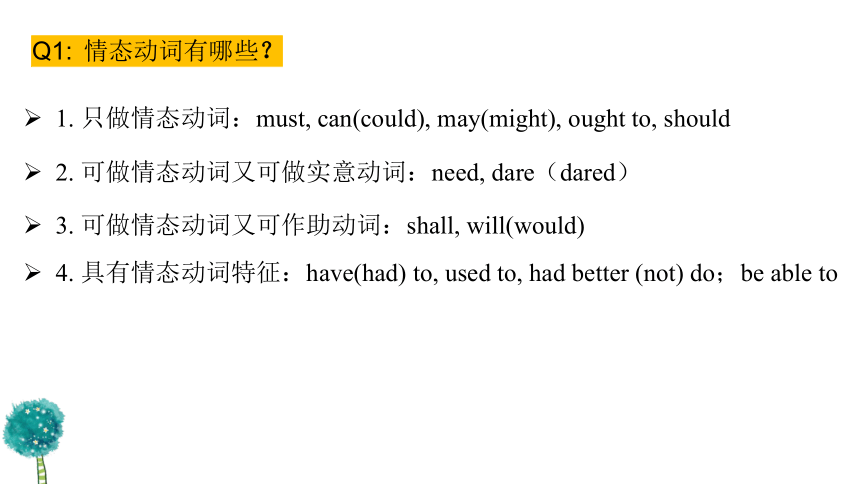


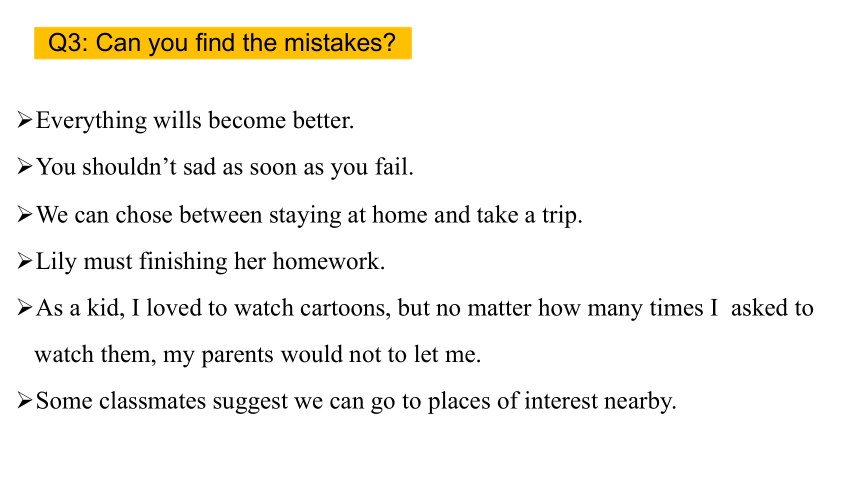

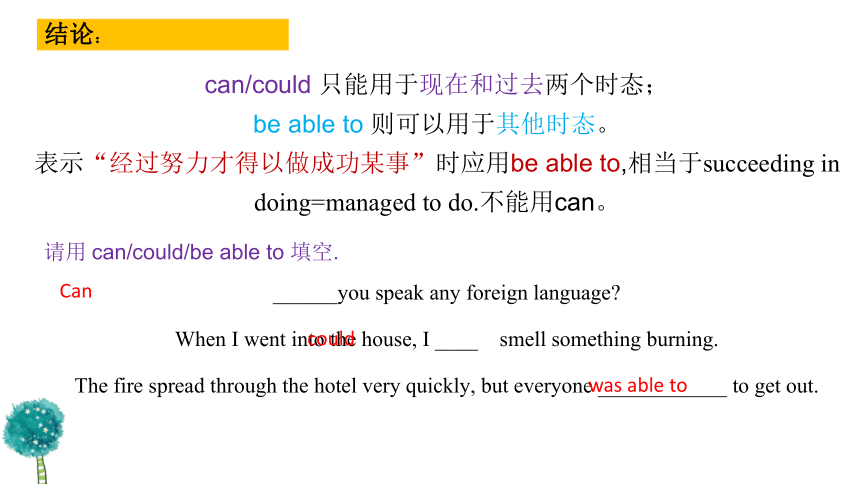
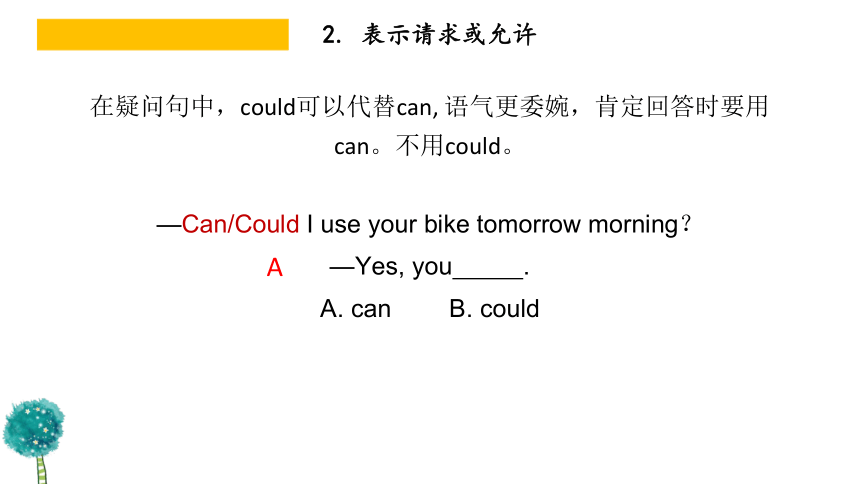
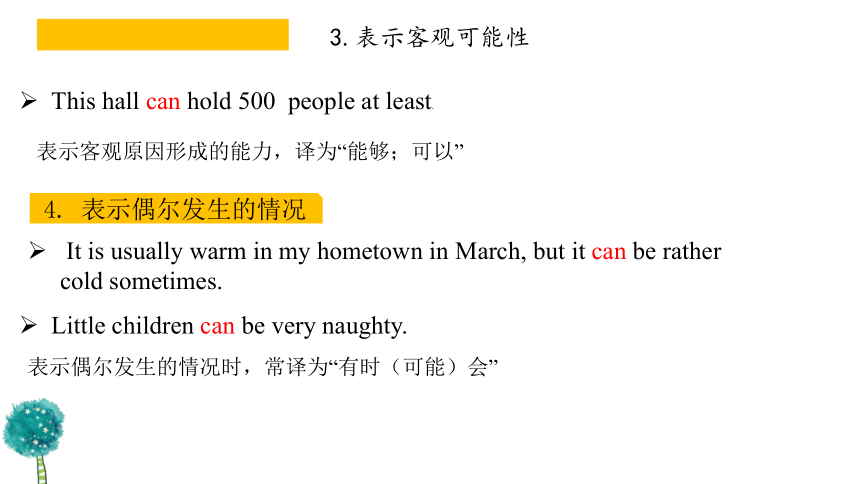

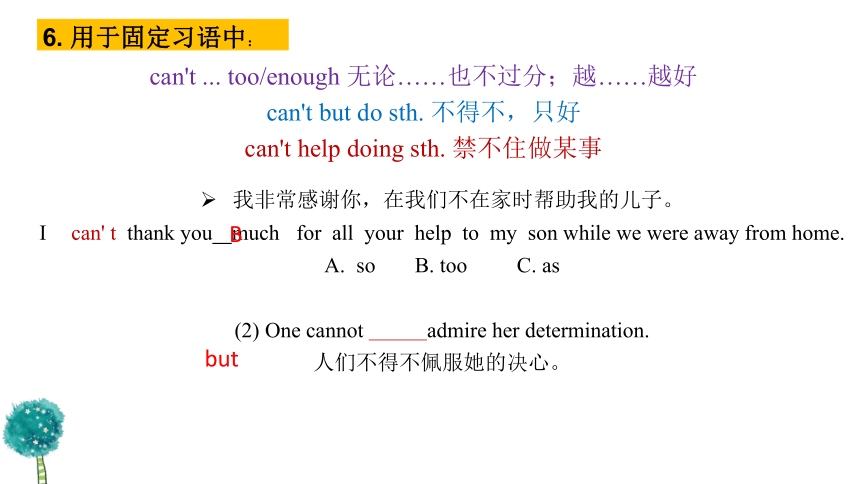

文档简介
(共38张PPT)
情态动词(一)
Modal
Verbs
Q1:
情态动词有哪些?
1.
只做情态动词:must,
can(could),
may(might),
ought
to,
should
2.
可做情态动词又可做实意动词:need,
dare(dared)
3.
可做情态动词又可作助动词:shall,
will(would)
4.
具有情态动词特征:have(had)
to,
used
to,
had
better
(not)
do;be
able
to
Q2:情态动词的定义?
情态动词在句子中有一定的词义,表示说话人的某种感情或语气,对某一动作或状态的某种态度。
情态动词的特点:
2.
情态动词后跟动词原形,否定式构成是在情态动词后面加“not”。
1.
情态动词没有人称和数的变化。
3.
个别情态动词有现在式和过去式两种形式,过去式用来表达更加客气,委婉的语气,时态性不强,可用于过去,现在或将来。
Q3:
Can
you
find
the
mistakes?
Everything
wills
become
better.
You
shouldn’t
sad
as
soon
as
you
fail.
We
can
chose
between
staying
at
home
and
take
a
trip.
Lily
must
finishing
her
homework.
As
a
kid,
I
loved
to
watch
cartoons,
but
no
matter
how
many
times
I
asked
to
watch
them,
my
parents
would
not
to
let
me.
Some
classmates
suggest
we
can
go
to
places
of
interest
nearby.
一.
can/can't
;
could/couldn't;
be
able
to的用法
对比:
I
am
confident
that
we
can
defeat
the
epidemic!
Some
of
us
can
use
the
computer
now,
but
we
couldn't
ten
years
ago.
You
will
be
able
to
win
more
prizes.
I
haven’t
been
able
to
sleep
recently.
can/could
只能用于现在和过去两个时态;
be
able
to
则可以用于其他时态。
表示“经过努力才得以做成功某事”时应用be
able
to,相当于succeeding
in
doing=managed
to
do.不能用can。
______you
speak
any
foreign
language?
When
I
went
into
the
house,
I
____
smell
something
burning.
The
fire
spread
through
the
hotel
very
quickly,
but
everyone
____________
to
get
out.
Can
could
was
able
to
请用
can/could/be
able
to
填空.
结论:
2.
表示请求或允许
在疑问句中,could可以代替can,
语气更委婉,肯定回答时要用can。不用could。
—Can/Could
I
use
your
bike
tomorrow
morning?
—Yes,
you
.
A.
can
B.
could
A
3.表示客观可能性
This
hall
can
hold
500
people
at
least.
表示客观原因形成的能力,译为“能够;可以”
4.
表示偶尔发生的情况
It
is
usually
warm
in
my
hometown
in
March,
but
it
can
be
rather
cold
sometimes.
Little
children
can
be
very
naughty.
表示偶尔发生的情况时,常译为“有时(可能)会”
How
can
you
treat
me
like
that?
5.
can表示惊异、怀疑、迷惑等态度,常用于否定句和疑问句中。
How
can
you
believe
in
such
a
person?
How
can
that
be
true?
I
can’t
believe
my
eyes
and
ears.
can't
...
too/enough
无论……也不过分;越……越好
can't
but
do
sth.
不得不,只好
can't
help
doing
sth.
禁不住做某事
我非常感谢你,在我们不在家时帮助我的儿子。
I
can'
t
thank
you
much
for
all
your
help
to
my
son
while
we
were
away
from
home.
A.
so
B.
too
C.
as
(2)
One
cannot
admire
her
determination.
人们不得不佩服她的决心。
but
B
6.
用于固定习语中:
读一读下列句子,说一说是以上哪一种用法
1.
His
mother
can
speak
English.2.
Even
experienced
teachers
can
make
mistakes.3.
Could
I
come
to
see
you
tomorrow?
4.
How
can
you
be
so
careless?5.
I
can
but
wait
until
Jone
comes.6.
You
can't
be
too
careful
to
drive
your
car
in
the
city
now.
7.
Luckily,
he
was
able
to
escape
from
the
big
fire
in
the
end.
二.
may/might的用法
1.
表请求和允许
might
比may语气更委婉,否定回答时可用can’t
或mustn’t,
表示“不可以,禁止”
--Might/May
I
smoke
in
this
room?
--No,
you
mustn’t/
No,
you
can’t./
You’d
better
not.
--May/Might
I
take
this
book
out
of
the
room?
--Yes,
you
can./Yes,
please./Certainly.
2.
固定搭配中
may/might
as
well
+
动词原形不妨,还是...为好=had
better
do
sth
may/might
well
+
动词原形
很可能
.....
=be
likely
to
do
1.你不妨告诉他事实吧。
You
may/might
______
tell
him
the
truth.
2.他现在很可能待在北京。
He
may/might_______stay
in
Beijing
now.
as
well
well
3.may用于祈使句表示祝愿
May
you
succeed
!
May
you
merry
christmas
!
May
you
have
a
lovely
day
!
练习:
--May
I
watch
TV
now?
--______________________________(肯定回答)
--_________________________________________(否定回答)
1.
既然你已经得到了这一个机会,不妨就充分利用它。_____________________________________________________________
2.
他的外貌变化很大,你很可能认不出他了。_____________________________________________________________
3.祝你玩得愉快。_____________________________________________________________
Yes,
you
can./Yes,
please./Certainly.
No,
you
mustn’t/
No,
you
can’t./
You’d
better
not.
Now
that
you
have
got
a
chance,
you
may
as
well
make
the
most
of
it.
Her
appearance
has
changed
so
much
that
you
may
well
not
recognize
her.
May
you
have
a
good
time
!
三、shall的用法
1.
在疑问句中,用于第1、3人称,表示征求对方意见.
Shall
the
driver
wait
outside
?
You
shall
fail
if
you
don't
work
hard.(警告)
He
shall
have
the
book
when
I
finish
it.
(允诺)
He
shall
be
punished.
(威胁)
Nothing
shall
stop
us
from
carrying
out
the
plan.(强制性)
2.
在肯定句中,用于第2、3人称,表示警告、允诺、命令或威胁
3.用于法律、条约、规定文书等正式文件
No
person
shall
smoke
here.
“The
interest
shall
be
divided
into
five
parts,
according
to
the
agreement
made
by
both
sides”
declared
the
judge.
The
sign
says
all
payments
shall
be
made
in
cash.
四、should/shouldn’t;
ought
to
(ought
not
to)的用法
1.
should
和ought
to
都可表义务,译为“应该”
As
a
League
member,
you
should/ought
to
set
a
good
example
to
your
classmates.
You
should
be
polite
to
your
teachers.
You
shouldn’t
waste
any
time.
2.据经验或事实来表达合理的推断-理应
Mary
took
dancing
classes
for
years;
she
should
be
an
excellent
dancer.
It
is
nearly
seven
o'clock.
Jack
should
be
here
at
any
moment.
It
is
said
that
there
are
plenty
of
hotels
in
that
town.
There
should
not
be
any
difficulty
for
you
to
find
somewhere
to
stay.
3.
表惊讶、惋惜、不满等情绪,翻译为“竟然”
You
can
not
imagine
that
a
well-behaved
gentleman
should
be
so
rude.
I'm
surprised
that
you
should
have
done
such
a
thing.
Never
did
he
expect
that
the
conditions
should
be
so
terrible.
4.
Should
+
动词原形表虚拟语气,
可省略
在表建议、要求、命令、主张等动词的宾语从句中
。
insist,
order,
command,
suggest,
advice,
propose,
demand,
request,
require
Mike
insisted
that
she
didn't
steal
anything
and
(should)
not
be
scolded.
5.
should表示假设,万一
Should
you
be
fired,
your
health
care
and
other
benefits
will
not
be
immediately
cut
off.
Should
it
rain
tomorrow,
the
meeting
would
be
put
off.
Should
you
be
caught
by
the
teacher,
what
would
you
do?
读一读下列句子,说一说是以上哪一种用法
1.
You
should/ought
to
keep
you
promise.2.
Such
things
shouldn’t/ought
not
to
be
done.3.
It’s
seven
O’clock
.
They
should
be
here
now.4.
It’s
strange
that
you
should
say
that.5.
Should?it?rain?tomorrow,
the?meeting?would?be?put?off.6.
Shall
we
begin
our
lesson?7.
You
shall
suffer
for
this.8.
Tell
him
that
he
shall
have
the
book
tomorrow.9.
Persons
under
18
shall
not
be
employed
in
night
work.
五、must;
mustn’t
;
needn’t
;
have
to的用法
must是说话人的主观看法,而have
to则强调客观需要
must
只有一般现在时,have
to
有更多的时态形式
You
must
come
in
time.
The
play
isn’t
interesting,
I
really
must
go
now.
I
had
to
work
when
I
was
your
age.
1.
must和have
to表示必须,
一定要。
Attention!!!!
在回答must引出的问句时,如果是否定的,不能用mustn’t
(禁止,不准/许),
而用needn’t,
don’t
have
to
(不必)。
--Must
we
hand
in
our
exercise
books
today?
--Yes,
you
must.
--No,
you
don’t
have
to
/
you
needn’t.
2.mustn't
和needn't的区别。
mustn’t表示禁止;needn’t表示没必要
You
mustn’t
play
with
the
fire.
You
needn’t
come
tonight.
3.must表示偏要,硬要
John,
look
at
the
time.
Must
you
play
the
piano
at
such
a
late
hour?
—Who
is
the
girl
standing
over
there?
—Well,
if
you
must
know,
her
name
is
Marry.
Why
must
it
rain
today?
We
had
planned
to
go
camping.
选一选:
—Can
I
have
a
word
with
you,
mum?
—Oh,
dear,
if
you
_______.
A.
can
B.
must
C.
may
D.
should
—May
I
smoke
here?
—If
you
____,
choose
a
seat
in
the
smoking
section.
A.
should
B.
could
C.
may
D.
must
Why
_____
you
always
leave
your
dirty
clothes
in
the
bedroom?
A.
need
B.
can
C.
may
D.must
六、will/would的用法
1.will
和
would
都可以表示意志、愿望和决心
I
will
never
do
that
again.
Being
your
friend,
I
will
do
everything
I
can
for
you.
2.will
和
would
用于第二人称疑问句,表示请求和建议(would
比will
更委婉客气).
Will
you
please
tell
her
that
I’ll
be
back
in
twenty
minutes?
Would
you
pass
this
book
to
the
students
in
the
last
row?
3.
will
和
would
可表示习惯性动作。
其中,will表示现在的习惯,would表示过去的习惯性动作
Sometimes
the
cat
will
lie
there
all
the
afternoon.The
boy
would
sit
there
hour
after
hour,
looking
at
the
traffic
go
by.
4.won't
和wouldn't
坚决拒绝
I
won't
listen
to
your
nonsense.
The
dog
wouldn't
stop
barking.
5.
would
和used
to区别.
used
to
表示过去的习惯或过去某时期的状况,现在已经不存在了。He
used
to
drink
tea
but
now
he
drinks
coffee.
注意:否定可有两种形式:
I
usedn’t
to
go
there
.
(used
做情态动词)I
didn’t
use
to
go
there
.(used做实意动词)
would
强调过去反复的动作
Whenever
we
were
in
the
country,
we
would
play
hide
and
seek
in
the
fields.
七.
dare
&
need的用法
1.
dare
做情态动词时,主要用于疑问句、否定句和条件从句中,一般不
用于肯定句中。
--Dare
you
walk
through
the
forest
at
night?--Yes,
I
dare
(肯定回答)--No,
I
daren’t
(否定回答)
If
you
dare
speak
to
me
like
that
again,
you’ll
be
sorry.
2.
dare
还可作实义动词用,有人称、时态和数的变化。后面常接带to的不定式。
I
dare
to
swim
across
this
river.
He
does
not
dare
to
answer.
Don't
you
dare
to
touch
it?
Did?he?dare?(to)?tell?her?
3.英语口语中常用的dare的几个结构
I
dare
say
things
will
improve
(我想,大概,可能,或许)
How
dare
you
ask
me
such
questions?(你怎么敢.....)I
dare
you
to
tell
your
parents.(我谅你也不敢........)
1.need
做情态动词时,常用于疑问句、否定句。
You
needn’t
come
so
early.
--
Need
I
finish
the
work
today?--
Yes,
you
must./
No,
you
needn’t
2.
need
还可作实义动词,有人称、时态和数的变化。后面常接带to的不定式。
He
needs
to
finish
his
homework
today.
Do
I
need
to
prepare?
对比:
情态动词
实义动词
肯定式
He
dares
to
escape.
He
needs
to
escape.
否定式
He
daren’t
escape.
He
needn’t
escape.
He
doesn’t
dare
(to)
escape.
He
doesn’t
need
to
escape.
疑问式
Dare
he
escape?
Need
he
escape?
Does
he
dare
(to)
escape?
Does
he
need
to
escape?
判断下列句子是情态动词用法还是实意动词用法?
1.
Dare?you?tell?her?the?truth??
2.
Did?he?dare?to
tell?her??
3.
I?don't?know?whether?he?dare?try.?
4.
The?boy?stood?before?the?teacher,?not?daring?to?look?up.?
5.
Nobody
need
be
afraid
of
catching
the
disease.
6.
John
told
me
I
needn't
wait
.
7.
Tell
her
she
doesn't
need
to
work
tonight.
8.
Need
I
tell
Tom
what
happened
today?
9.
What
does
he
need
?
情态动词(一)
Modal
Verbs
Q1:
情态动词有哪些?
1.
只做情态动词:must,
can(could),
may(might),
ought
to,
should
2.
可做情态动词又可做实意动词:need,
dare(dared)
3.
可做情态动词又可作助动词:shall,
will(would)
4.
具有情态动词特征:have(had)
to,
used
to,
had
better
(not)
do;be
able
to
Q2:情态动词的定义?
情态动词在句子中有一定的词义,表示说话人的某种感情或语气,对某一动作或状态的某种态度。
情态动词的特点:
2.
情态动词后跟动词原形,否定式构成是在情态动词后面加“not”。
1.
情态动词没有人称和数的变化。
3.
个别情态动词有现在式和过去式两种形式,过去式用来表达更加客气,委婉的语气,时态性不强,可用于过去,现在或将来。
Q3:
Can
you
find
the
mistakes?
Everything
wills
become
better.
You
shouldn’t
sad
as
soon
as
you
fail.
We
can
chose
between
staying
at
home
and
take
a
trip.
Lily
must
finishing
her
homework.
As
a
kid,
I
loved
to
watch
cartoons,
but
no
matter
how
many
times
I
asked
to
watch
them,
my
parents
would
not
to
let
me.
Some
classmates
suggest
we
can
go
to
places
of
interest
nearby.
一.
can/can't
;
could/couldn't;
be
able
to的用法
对比:
I
am
confident
that
we
can
defeat
the
epidemic!
Some
of
us
can
use
the
computer
now,
but
we
couldn't
ten
years
ago.
You
will
be
able
to
win
more
prizes.
I
haven’t
been
able
to
sleep
recently.
can/could
只能用于现在和过去两个时态;
be
able
to
则可以用于其他时态。
表示“经过努力才得以做成功某事”时应用be
able
to,相当于succeeding
in
doing=managed
to
do.不能用can。
______you
speak
any
foreign
language?
When
I
went
into
the
house,
I
____
smell
something
burning.
The
fire
spread
through
the
hotel
very
quickly,
but
everyone
____________
to
get
out.
Can
could
was
able
to
请用
can/could/be
able
to
填空.
结论:
2.
表示请求或允许
在疑问句中,could可以代替can,
语气更委婉,肯定回答时要用can。不用could。
—Can/Could
I
use
your
bike
tomorrow
morning?
—Yes,
you
.
A.
can
B.
could
A
3.表示客观可能性
This
hall
can
hold
500
people
at
least.
表示客观原因形成的能力,译为“能够;可以”
4.
表示偶尔发生的情况
It
is
usually
warm
in
my
hometown
in
March,
but
it
can
be
rather
cold
sometimes.
Little
children
can
be
very
naughty.
表示偶尔发生的情况时,常译为“有时(可能)会”
How
can
you
treat
me
like
that?
5.
can表示惊异、怀疑、迷惑等态度,常用于否定句和疑问句中。
How
can
you
believe
in
such
a
person?
How
can
that
be
true?
I
can’t
believe
my
eyes
and
ears.
can't
...
too/enough
无论……也不过分;越……越好
can't
but
do
sth.
不得不,只好
can't
help
doing
sth.
禁不住做某事
我非常感谢你,在我们不在家时帮助我的儿子。
I
can'
t
thank
you
much
for
all
your
help
to
my
son
while
we
were
away
from
home.
A.
so
B.
too
C.
as
(2)
One
cannot
admire
her
determination.
人们不得不佩服她的决心。
but
B
6.
用于固定习语中:
读一读下列句子,说一说是以上哪一种用法
1.
His
mother
can
speak
English.2.
Even
experienced
teachers
can
make
mistakes.3.
Could
I
come
to
see
you
tomorrow?
4.
How
can
you
be
so
careless?5.
I
can
but
wait
until
Jone
comes.6.
You
can't
be
too
careful
to
drive
your
car
in
the
city
now.
7.
Luckily,
he
was
able
to
escape
from
the
big
fire
in
the
end.
二.
may/might的用法
1.
表请求和允许
might
比may语气更委婉,否定回答时可用can’t
或mustn’t,
表示“不可以,禁止”
--Might/May
I
smoke
in
this
room?
--No,
you
mustn’t/
No,
you
can’t./
You’d
better
not.
--May/Might
I
take
this
book
out
of
the
room?
--Yes,
you
can./Yes,
please./Certainly.
2.
固定搭配中
may/might
as
well
+
动词原形不妨,还是...为好=had
better
do
sth
may/might
well
+
动词原形
很可能
.....
=be
likely
to
do
1.你不妨告诉他事实吧。
You
may/might
______
tell
him
the
truth.
2.他现在很可能待在北京。
He
may/might_______stay
in
Beijing
now.
as
well
well
3.may用于祈使句表示祝愿
May
you
succeed
!
May
you
merry
christmas
!
May
you
have
a
lovely
day
!
练习:
--May
I
watch
TV
now?
--______________________________(肯定回答)
--_________________________________________(否定回答)
1.
既然你已经得到了这一个机会,不妨就充分利用它。_____________________________________________________________
2.
他的外貌变化很大,你很可能认不出他了。_____________________________________________________________
3.祝你玩得愉快。_____________________________________________________________
Yes,
you
can./Yes,
please./Certainly.
No,
you
mustn’t/
No,
you
can’t./
You’d
better
not.
Now
that
you
have
got
a
chance,
you
may
as
well
make
the
most
of
it.
Her
appearance
has
changed
so
much
that
you
may
well
not
recognize
her.
May
you
have
a
good
time
!
三、shall的用法
1.
在疑问句中,用于第1、3人称,表示征求对方意见.
Shall
the
driver
wait
outside
?
You
shall
fail
if
you
don't
work
hard.(警告)
He
shall
have
the
book
when
I
finish
it.
(允诺)
He
shall
be
punished.
(威胁)
Nothing
shall
stop
us
from
carrying
out
the
plan.(强制性)
2.
在肯定句中,用于第2、3人称,表示警告、允诺、命令或威胁
3.用于法律、条约、规定文书等正式文件
No
person
shall
smoke
here.
“The
interest
shall
be
divided
into
five
parts,
according
to
the
agreement
made
by
both
sides”
declared
the
judge.
The
sign
says
all
payments
shall
be
made
in
cash.
四、should/shouldn’t;
ought
to
(ought
not
to)的用法
1.
should
和ought
to
都可表义务,译为“应该”
As
a
League
member,
you
should/ought
to
set
a
good
example
to
your
classmates.
You
should
be
polite
to
your
teachers.
You
shouldn’t
waste
any
time.
2.据经验或事实来表达合理的推断-理应
Mary
took
dancing
classes
for
years;
she
should
be
an
excellent
dancer.
It
is
nearly
seven
o'clock.
Jack
should
be
here
at
any
moment.
It
is
said
that
there
are
plenty
of
hotels
in
that
town.
There
should
not
be
any
difficulty
for
you
to
find
somewhere
to
stay.
3.
表惊讶、惋惜、不满等情绪,翻译为“竟然”
You
can
not
imagine
that
a
well-behaved
gentleman
should
be
so
rude.
I'm
surprised
that
you
should
have
done
such
a
thing.
Never
did
he
expect
that
the
conditions
should
be
so
terrible.
4.
Should
+
动词原形表虚拟语气,
可省略
在表建议、要求、命令、主张等动词的宾语从句中
。
insist,
order,
command,
suggest,
advice,
propose,
demand,
request,
require
Mike
insisted
that
she
didn't
steal
anything
and
(should)
not
be
scolded.
5.
should表示假设,万一
Should
you
be
fired,
your
health
care
and
other
benefits
will
not
be
immediately
cut
off.
Should
it
rain
tomorrow,
the
meeting
would
be
put
off.
Should
you
be
caught
by
the
teacher,
what
would
you
do?
读一读下列句子,说一说是以上哪一种用法
1.
You
should/ought
to
keep
you
promise.2.
Such
things
shouldn’t/ought
not
to
be
done.3.
It’s
seven
O’clock
.
They
should
be
here
now.4.
It’s
strange
that
you
should
say
that.5.
Should?it?rain?tomorrow,
the?meeting?would?be?put?off.6.
Shall
we
begin
our
lesson?7.
You
shall
suffer
for
this.8.
Tell
him
that
he
shall
have
the
book
tomorrow.9.
Persons
under
18
shall
not
be
employed
in
night
work.
五、must;
mustn’t
;
needn’t
;
have
to的用法
must是说话人的主观看法,而have
to则强调客观需要
must
只有一般现在时,have
to
有更多的时态形式
You
must
come
in
time.
The
play
isn’t
interesting,
I
really
must
go
now.
I
had
to
work
when
I
was
your
age.
1.
must和have
to表示必须,
一定要。
Attention!!!!
在回答must引出的问句时,如果是否定的,不能用mustn’t
(禁止,不准/许),
而用needn’t,
don’t
have
to
(不必)。
--Must
we
hand
in
our
exercise
books
today?
--Yes,
you
must.
--No,
you
don’t
have
to
/
you
needn’t.
2.mustn't
和needn't的区别。
mustn’t表示禁止;needn’t表示没必要
You
mustn’t
play
with
the
fire.
You
needn’t
come
tonight.
3.must表示偏要,硬要
John,
look
at
the
time.
Must
you
play
the
piano
at
such
a
late
hour?
—Who
is
the
girl
standing
over
there?
—Well,
if
you
must
know,
her
name
is
Marry.
Why
must
it
rain
today?
We
had
planned
to
go
camping.
选一选:
—Can
I
have
a
word
with
you,
mum?
—Oh,
dear,
if
you
_______.
A.
can
B.
must
C.
may
D.
should
—May
I
smoke
here?
—If
you
____,
choose
a
seat
in
the
smoking
section.
A.
should
B.
could
C.
may
D.
must
Why
_____
you
always
leave
your
dirty
clothes
in
the
bedroom?
A.
need
B.
can
C.
may
D.must
六、will/would的用法
1.will
和
would
都可以表示意志、愿望和决心
I
will
never
do
that
again.
Being
your
friend,
I
will
do
everything
I
can
for
you.
2.will
和
would
用于第二人称疑问句,表示请求和建议(would
比will
更委婉客气).
Will
you
please
tell
her
that
I’ll
be
back
in
twenty
minutes?
Would
you
pass
this
book
to
the
students
in
the
last
row?
3.
will
和
would
可表示习惯性动作。
其中,will表示现在的习惯,would表示过去的习惯性动作
Sometimes
the
cat
will
lie
there
all
the
afternoon.The
boy
would
sit
there
hour
after
hour,
looking
at
the
traffic
go
by.
4.won't
和wouldn't
坚决拒绝
I
won't
listen
to
your
nonsense.
The
dog
wouldn't
stop
barking.
5.
would
和used
to区别.
used
to
表示过去的习惯或过去某时期的状况,现在已经不存在了。He
used
to
drink
tea
but
now
he
drinks
coffee.
注意:否定可有两种形式:
I
usedn’t
to
go
there
.
(used
做情态动词)I
didn’t
use
to
go
there
.(used做实意动词)
would
强调过去反复的动作
Whenever
we
were
in
the
country,
we
would
play
hide
and
seek
in
the
fields.
七.
dare
&
need的用法
1.
dare
做情态动词时,主要用于疑问句、否定句和条件从句中,一般不
用于肯定句中。
--Dare
you
walk
through
the
forest
at
night?--Yes,
I
dare
(肯定回答)--No,
I
daren’t
(否定回答)
If
you
dare
speak
to
me
like
that
again,
you’ll
be
sorry.
2.
dare
还可作实义动词用,有人称、时态和数的变化。后面常接带to的不定式。
I
dare
to
swim
across
this
river.
He
does
not
dare
to
answer.
Don't
you
dare
to
touch
it?
Did?he?dare?(to)?tell?her?
3.英语口语中常用的dare的几个结构
I
dare
say
things
will
improve
(我想,大概,可能,或许)
How
dare
you
ask
me
such
questions?(你怎么敢.....)I
dare
you
to
tell
your
parents.(我谅你也不敢........)
1.need
做情态动词时,常用于疑问句、否定句。
You
needn’t
come
so
early.
--
Need
I
finish
the
work
today?--
Yes,
you
must./
No,
you
needn’t
2.
need
还可作实义动词,有人称、时态和数的变化。后面常接带to的不定式。
He
needs
to
finish
his
homework
today.
Do
I
need
to
prepare?
对比:
情态动词
实义动词
肯定式
He
dares
to
escape.
He
needs
to
escape.
否定式
He
daren’t
escape.
He
needn’t
escape.
He
doesn’t
dare
(to)
escape.
He
doesn’t
need
to
escape.
疑问式
Dare
he
escape?
Need
he
escape?
Does
he
dare
(to)
escape?
Does
he
need
to
escape?
判断下列句子是情态动词用法还是实意动词用法?
1.
Dare?you?tell?her?the?truth??
2.
Did?he?dare?to
tell?her??
3.
I?don't?know?whether?he?dare?try.?
4.
The?boy?stood?before?the?teacher,?not?daring?to?look?up.?
5.
Nobody
need
be
afraid
of
catching
the
disease.
6.
John
told
me
I
needn't
wait
.
7.
Tell
her
she
doesn't
need
to
work
tonight.
8.
Need
I
tell
Tom
what
happened
today?
9.
What
does
he
need
?
